| Pages:
1
2
3
4 |
huesos
Nomad
 
Posts: 149
Registered: 6-24-2013
Member Is Offline
|
|
Las Barrancas installation
In the early eighties driving into Las Barrrancas from the South road to La Purisma there was an out of place steel power or desal plant sitting on
the ocean. The word was that it was a West German project. Facts that could be gathered were only hearsay. It was fairly incredible to reach the top
of a shallow grade and see this thing sitting in the middle of nowhere. Someone told me that it had been dismantled. Does anyone know anything about
this project?
|
|
|
cocoscabana
Junior Nomad

Posts: 83
Registered: 6-24-2013
Location: Mulege and British Columbia
Member Is Offline
Mood: Que sera, sera!!!
|
|
We were told that a ?german? Company built a solar energy plant there, trained Mexicans and then turned it over to them. It was then scrapped!!!
There is a photo of the plant on this site. http://www.en.nuestro-mexico.com/Baja-California-Sur/Comondu...
|
|
|
huesos
Nomad
 
Posts: 149
Registered: 6-24-2013
Member Is Offline
|
|
Solar tech
That is a good website. During that period it must have been one of the first solar generators. I have to admit that I did not take the time to try to
study the design but I did not find a picture of it on the website. It was an entirely futuristic looking thing.
|
|
|
cocoscabana
Junior Nomad

Posts: 83
Registered: 6-24-2013
Location: Mulege and British Columbia
Member Is Offline
Mood: Que sera, sera!!!
|
|
At the bottom of the website there is a brown photo labelled "Proyecto sontlan 1982". I think that is the building you are talking about
|
|
|
Graham
Senior Nomad
  
Posts: 558
Registered: 6-16-2006
Location: San Diego and DeTour, MI
Member Is Offline
|
|
As I walked my burro, Bonny, down the Pacific coast of Baja in 1984 I happened upon the facility there at Las Barrancas and spent a night with the
German engineers.
This passage from chapter 29 of my book, Into a Desert Place, tells the story:
"Cresting one ridge, I suddenly understood how Cortés must have felt when he looked for the first time on the magnificent capital city of the Aztecs.
I was looking down on something that seemed to have been taken from a “Star Wars” movie set—an incongruous, futuristic, complex of towers, huge shiny
dishes, and other high-tech structures.
We wandered down into the fishcamp, village, town—no word seemed appropriate to describe the coastal settlement of Las Barrancas. It didn’t belong in
Baja. Nor did the primitive fishermen’s shacks belong on the same planet as all the impressive technology. I had found the Teutonic sun worshippers
all right. “Only the Germans could have thought up this lot,” I said to myself as I led my dumbfounded burro into “town.”
Passing the school, we picked up an audience of cheering, laughing and waving Mexican children. I waved back and asked one of the bolder youngsters if
there was a store. He directed me to a small blue house down the street. The “store” had the basics but no beer. I was disappointed. I had been
dreaming of a cold one all day. Instead, I treated myself to some milk and cookies. A curious but polite crowd gathered around. Thankfully, Bonny
remained calm. He was probably exhausted. I still had nightmares about the time he spooked in San Ignacio.
One of the fishermen, who spoke better English than I did Spanish, explained that the plant was a joint German-Mexican project experimenting with wind
and solar energy. Wanting to know more, I wandered over to pay my respects to the German engineers. The first person I met had only just arrived from
Europe. Clearly, the last thing this jet lagged, culture shocked German expected to see was a desert-bedraggled Englishman walking a bewildered little
white burro.
I’m not sure who was more curious about whom. But I was invited into their simple quarters, offered a beer (I hadn’t wished in vain) and introduced to
the other seven Germans. They all worked for the Dornier company (of World War Two bomber fame). One of them was married to a Mexican girl, and he was
a more or less permanent resident. The others apparently stayed for just a couple of weeks at a time.
We had much to talk about. I was given a room for the night, so I tied Bonny to a cactus, gave him a cookie and told him to look after himself while I
went back to help my fellow Europeans deal with a barrel of beer they had just brought in.
Before anyone got too drunk, I asked if any of them fancied his hand at repairing a camera. One tall, blond chap managed to take the camera apart, but
after tinkering around a bit he shook his head and put it back together again.
I drowned my sorrows in the beer and asked about their projects. Apparently the plant was producing twenty tons of fresh water daily by solar
evaporation of seawater, and an additional twenty tons by diesel powered osmosis. Solar power was also used to heat water and to make ice, which they
were producing at the rate of two tons a day for the local fishermen. They also had in operation a shockfrost room for rapid freezing and a cold
storage room. They had just finished boiling and freezing a ton of lobster which had been shipped to La Paz. Wind power was harnessed by an enormous
propeller spinning smoothly in the Pacific breeze.
When the room started spinning I decided to hit the sack and leave the die-hard Bierkeller-trained professionals to carry on making merry to the early
hours.
Next morning, I was given a huge breakfast and invited on a high-tech tour. I slipped a roll of film into a borrowed camera and snapped my way around
the plant. It was a fascinating, futuristic vision of Baja’s potential. What a prospect, obtaining ice, fresh water, and heat from the wind, the sun,
and the sea! I should have felt good about this clean and efficient utilization of energy, but I loaded my donkey and walked away a little saddened by
what German genius and technical skill might do for the forgotten peninsula."
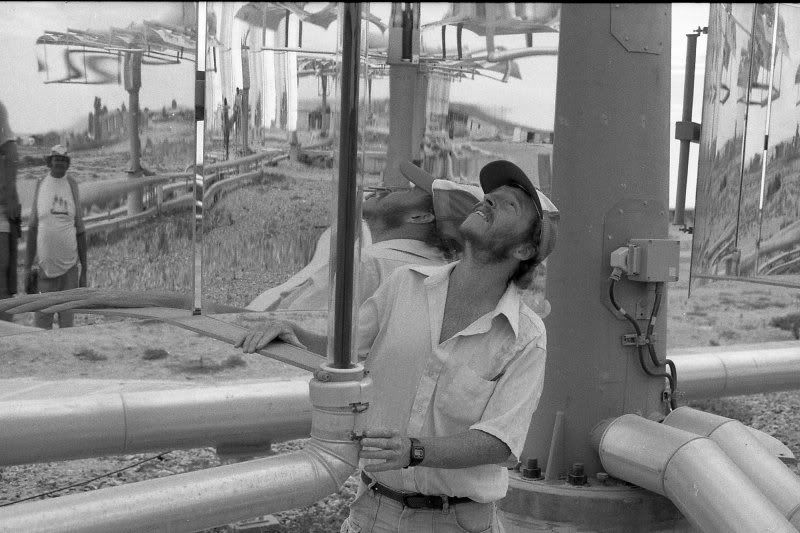
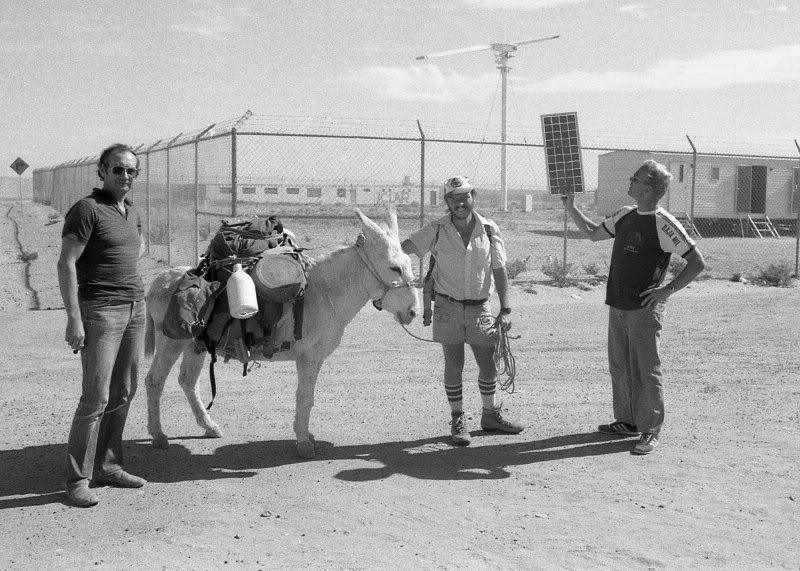
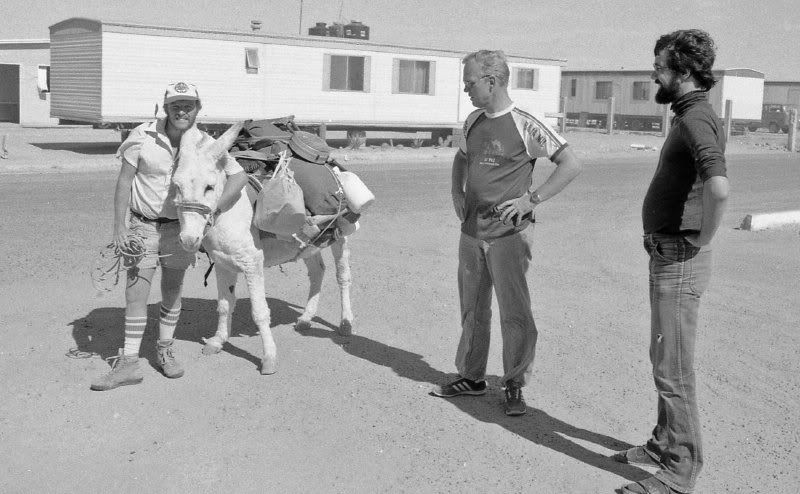
|
|
|
David K
Honored Nomad
        
Posts: 65402
Registered: 8-30-2002
Location: San Diego County
Member Is Offline
Mood: Have Baja Fever
|
|
Thanks Graham, a great reply to the Las Barrancas history question!
|
|
|
huesos
Nomad
 
Posts: 149
Registered: 6-24-2013
Member Is Offline
|
|
nice burro
Graham,
That was a great story of that leg of your journey and a good photo of you at the base of the array. Bonny looks like one of those good natured burros
that you run into every once in a while. Wish I could have crossed paths with the two of you on that trip.
|
|
|
Correcamino
Junior Nomad

Posts: 78
Registered: 4-6-2013
Location: Sabre Springs, CA
Member Is Offline
|
|
Here's the photo (from Panoramio) for those too lazy to click through:
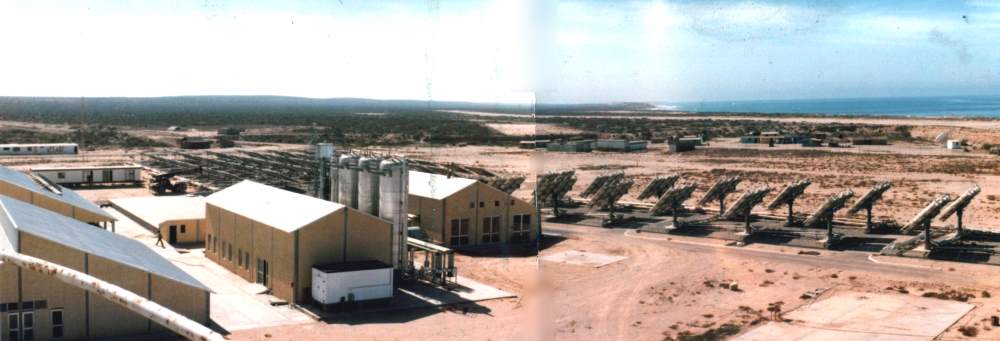
[Edited on 7-27-2013 by BajaNomad]
Si sirve, sirve.
|
|
|
Correcamino
Junior Nomad

Posts: 78
Registered: 4-6-2013
Location: Sabre Springs, CA
Member Is Offline
|
|
Here's a more recent, and artistic, shot of the derelict structure (from Panoramio again, by ALONSO "RENO"):
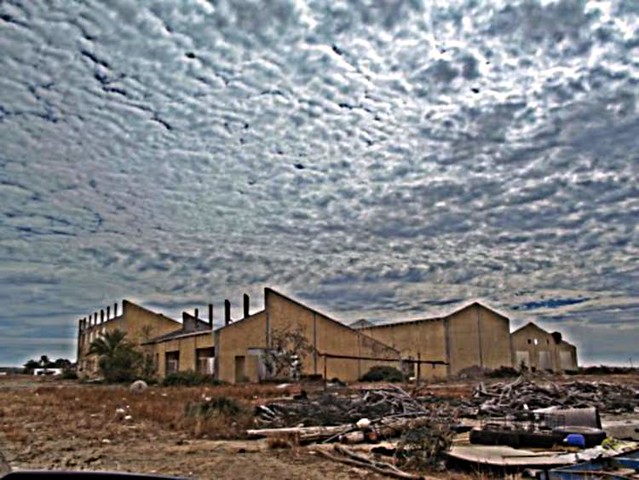
[Edited on 7-25-2013 by Correcamino]
Si sirve, sirve.
|
|
|
oladulce
Super Nomad
   
Posts: 1625
Registered: 5-30-2005
Location: bcs
Member Is Offline
|
|
Very interesting. I had no idea the installation was so large. Thanks for the photos.
Here's what it looks like nowadays - down to a few walls with casas all around. It was a little breezy on this day...

[Edited on 7-26-2013 by oladulce]
|
|
|
tiotomasbcs
Super Nomad
   
Posts: 1837
Registered: 7-30-2007
Location: El Pescadero
Member Is Offline
|
|
Very interesting story! I camped out long ago at the boca of San Gregorio and wondered about all the lights that lit up the night approx 10 miles
away. Sadly it was not maintained-used after the Germans left?! Ice,electricity, a/c-heat in the middle of the Baja desert. Crazy. Thanks for the
question & answers, esp the pictures! Tio 
|
|
|
ddawson
Nomad
 
Posts: 103
Registered: 9-6-2010
Location: Hilo
Member Is Offline
|
|
Interesting website with pics:
http://www.info-inmarsat.gmxhome.de/barrancas.html
|
|
|
David K
Honored Nomad
        
Posts: 65402
Registered: 8-30-2002
Location: San Diego County
Member Is Offline
Mood: Have Baja Fever
|
|
The last line in that web page is great:
"Project Sontlan works for several years quiet well and deliver energy for Las Barrancas. But now in 2012 have a look to the both following pictures.
All removable parts of the project Sontlan, build for 90 millions DM, has been gone to somewhere!"
(DM= Deutsche/ German Marks)
"...Gone to somewhere"!!! 
|
|
|
willardguy
Elite Nomad
     
Posts: 6451
Registered: 9-19-2009
Member Is Offline
|
|
this is a fascinating story, where did all those high tech gizmo's go? I bet a closer look around town you can spot roofs made out of those pretty
blue glass panels, wiring is now fences, everything got turned into something useful! here are the lessons learned from these projects:
http://www.docstoc.com/docs/1028803/Jorge-Huacuz-Director-No...
|
|
|
capt. mike
Elite Nomad
     
Posts: 8085
Registered: 11-26-2002
Location: Bat Cave
Member Is Offline
Mood: Sling time!
|
|
before the locals stopped keeping the Las Barancas strip safe for us we ran a monthly clinic there, phx flying Sams - in the late 80s early 90s.
for a while we tried to use the La Purisima strip and van in but that later became problematic - so adios Las Barancas.
the German plant was abandoned by the time we began work there but we always walked around and checked it out. Very interesting stuff. ahead of its
time in many ways. Like the Germans generally.
La Paz will soon have a 13 Meg PV solar utility scale grid plant going. CFE is jumping all over solar power now. Our friends have completed a panel
mfg plant in Hermosillo using all new state of the art equip imported from china.
formerly Ordained in Rev. Ewing\'s Church by Mail - busted on tax fraud.......
Now joined L. Ron Hoover\'s church of Appliantology
\"Remember there is a big difference between kneeling down and bending over....\"
www.facebook.com/michael.l.goering |
|
|
BajaNomad
Super Administrator
        
Posts: 5014
Registered: 8-1-2002
Location: San Diego, CA
Member Is Offline
Mood: INTP-A
|
|
La Paz and Las Barrancas - Sonntlan
In a joint project between the Federal Republic of Germany and Mexico in the late 1970s, a
solar multi-stage flash distillation plant was built in a desalination research facility in La Paz. The
project was called SMSF. With a capacity of 10 m3/day, the plant was commissioned in 1980.
The plant consisted of 10 stages (8 heat recovery and 2 heat rejection) and had a 194 m2 solar
flat plate collector field for daytime operation, 2 X 162 m2 flat plate collector fields to supply heat
to the energy storage for night time operation. The plant was designed to operate continuously 24 h
a day; the storage could keep the plant working for over 28 h in normal conditions. A further
160 m2 parabolic concentrating collector field was also included, collectors were mounted on
high-precision two-axis tracking bases. The plant operated satisfactorily according to its design.
After the success of this project the German and Mexican governments signed agreements for
more research collaboration which gave rise to Sonntlan, a larger solar energy research project in
the early 1980s. Sonntlan had two parts, one in another state in Mexico researching air
conditioning and hotwater systems for houses, and the one in Las Barrancas, BCS, which involved
several different solar applications including solar desalination.
In Las Barranas, a fishing community on the coast of BCS, Sonntlan implemented an integral
system providing drinking desalinated water, ice, hot water, communications, refrigeration and
electricity to the community of 250 inhabitants. This included:
• A 250 kW peak PV generator
• A 1540 m2 solar hot water collector field (heat pipe collectors)
• 3 X 38 m3 hot water storage tanks
• 550.8 m2 of parabolic trough concentrating collectors for the hot oil system
• A 16 m3 hot oil storage tank
• Heat exchanger between hot oil and hot water circuits
• Diesel generators
• An 8 m3/day single stage waste heat recovery flash distillation unit
• A 20 m3/day multiple stage solar flash distillation unit
• A 20 m3/day reverse osmosis desalination unit
• An ice-making facility
• An absorption-compression deep freezing facility for local produce (fish)
• A PV-powered communications system
When the agreements ended, both plants (La Paz and Las Barrancas) operated for some time
and then the projects were just abandoned. Although the reasons for this are not perfectly clear, the
political climate of the time, the use of largely foreign technology and the lack local consultation
can explain partly why these operations came to a stop.
https://dspace.lboro.ac.uk/2134/5964 (from the PDF)
When I was young, I admired clever people. Now that I am old, I admire kind people.
– Rabbi Abraham Joshua Heschel
We know we must go back if we live, and we don`t know why.
– John Steinbeck, Log from the Sea of Cortez
https://www.regionalinternet.com
Affordable Domain Name Registration/Management & cPanel Web Hosting - since 1999 |
|
|
BajaNomad
Super Administrator
        
Posts: 5014
Registered: 8-1-2002
Location: San Diego, CA
Member Is Offline
Mood: INTP-A
|
|
From 1998:
"The dismantling consists of the organisational and the business side of the conducting of the: - dismantling of the technical facilities, their
disposal or utilisation, and the - disposal of the hazardous waste, including the oil-contaminated soil. The recycling and disposal of the hazardous
waste found at the Las Barrancas site and the sealing (including a draining system for the surface water) of the oil-contaminated area could be
completed during the project period. Because of the measures implemented so far during this project, no more hazards to the environment are emanating
from the SONNTLAN-Facilities. The 'facility ruins' still exist. During the project period, the Mexican government was unstable to create the legal
conditions which would have made the dismantling of the facilities in La Paz and Las Barrancas possible. The Mexican government is still very
interested in dismantling the facilities with German help. The decision now lies with the BMBF, whether to carry on with the dismantling of the
SONNTLAN-Facilities with financial resources from Germany or not. Corresponding funds have already been approved and are available.
http://www.opengrey.eu/item/display/10068/198437
When I was young, I admired clever people. Now that I am old, I admire kind people.
– Rabbi Abraham Joshua Heschel
We know we must go back if we live, and we don`t know why.
– John Steinbeck, Log from the Sea of Cortez
https://www.regionalinternet.com
Affordable Domain Name Registration/Management & cPanel Web Hosting - since 1999 |
|
|
Bajatripper
Ultra Nomad
    
Posts: 3152
Registered: 3-20-2010
Member Is Offline
|
|
The abandoned plant in La Paz is on the road to Pichilingue, about a mile north of town right where the road begins climbing up before Playa Coromuel
and just below Cueva de Las Calaveras. The buildings now appear to be office space.
There most certainly is but one side to every story: the TRUTH. Variations of it are nothing but lies.
|
|
|
bajagerman
Nomad
 
Posts: 129
Registered: 9-11-2013
Location: Hamburg / Germany
Member Is Offline
|
|
Project Sontlan at Las Barrancas
I have place photos via Panoramio to Google Earth. The will be present there end of month 8/2014. Also i have placed many details at my homepage www.info-inmarsat.gmxhome.de
please see there to Sontlan Las Barrancas. Report is written in english language. Joachim
Mail: JPaul@gmx.com
|
|
|
micah202
Super Nomad
   
Posts: 1615
Registered: 1-19-2011
Location: vancouver,BC
Member Is Offline
|
|
| Quote: | Originally posted by bajagerman
I have place photos via Panoramio to Google Earth. The will be present there end of month 8/2014. Also i have placed many details at my homepage www.info-inmarsat.gmxhome.de
please see there to Sontlan Las Barrancas. Report is written in english language. Joachim
Mail: JPaul@gmx.com |
....you were involved in the project?
http://www.info-inmarsat.gmxhome.de/Sontlan.html
...ahh..installing communications,,,and the whole project delayed a year because of a lie about there being a cargo helicopter!
......did german government feel happy with their investment of 90 million(!!!) markes in '77 ??......I hope that budget included some 'fun times' in
town and tequila bill,no? 
[Edited on 8-15-2014 by micah202]
|
|
|
| Pages:
1
2
3
4 |

